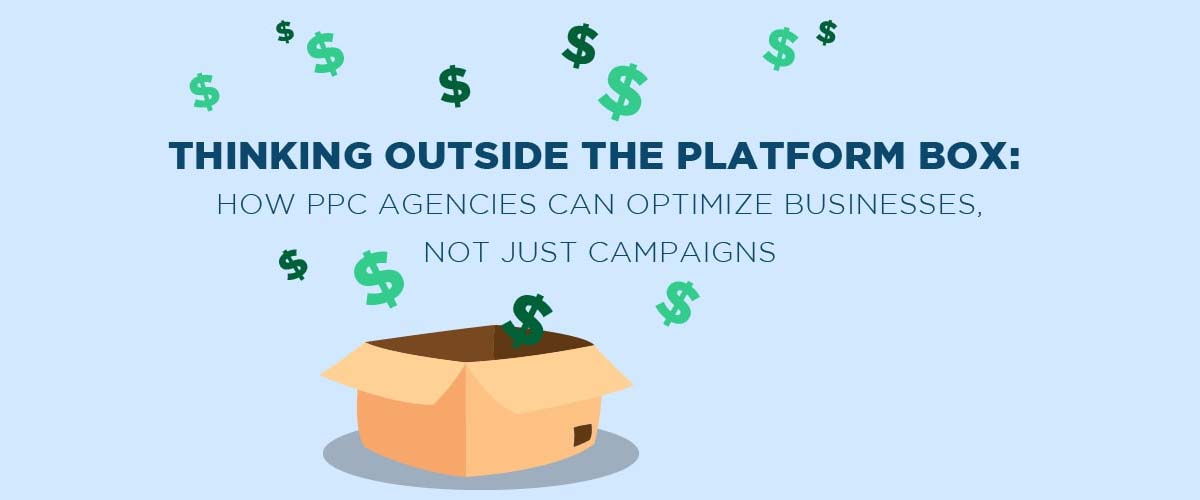PPC agencies sell platforms like Google AdWords and Microsoft Advertising to businesses as products designed to rapidly increase their growth.
And these platforms can, indeed, help propel huge gains for the companies that run ads on them.
Depending on the company and a range of other factors, PPC platforms can deliver results so dramatic that they surprise even the agencies that should be used to seeing them by now. Google AdWords and Microsoft Advertising –– fantastic products, right?
That’s the problem.
The more that PPC agencies understand AdWords, Microsoft Advertising, or any other PPC platform as a product to be sold –– and not a tool to be harnessed –– the less likely they are to help their customers find success.
There are a few ways this can play out. One of them is obvious and extreme. If a PPC agency is focused on a platform only as a product that needs selling, then it might decide that there’s no point in thinking about all the ways it could work better to meet their client’s needs. The agency may resign itself to the thinking that developing the platform is Google’s job (for example), and that their job is simply to sell it.
But that’s not exactly true of all agencies.
Can you trust your PPC agency? Be aware of these 5 red flags when choosing a digital agency.
Optimizing Google AdWords and Microsoft Advertising for clients
At Logical Position, we work closely with Google and Microsoft on actually improving their platforms. This may seem like a waste of time that could be better spent selling the platforms as they are, but this hasn’t been our experience. By testing the search engine’s betas and giving them critical feedback on issues we encounter, we’ve been able to improve their platforms in ways that ultimately make our clients’ campaigns more successful.
So when it comes time for an agency to suggest expanding a client’s PPC campaigns to a new platform, the agency might feel pressure to exaggerate the differences between the old platform and the new one, as if their purposes weren’t the same.
If they don’t, the agency may worry that the client will think that they’re being sold the same product twice.
At Logical Position, we know this worry to be unfounded. When we talk with our AdWords clients about expanding their campaigns into Microsoft Advertising, we skip the sales pitches and tell them the plain truth: Both platforms are tools for doing the same job, and we can do more of that job when we use both. Because our clients respond well to this approach, we’re able to expand their PPC campaigns onto new platforms and increase their chances of connecting with qualified customers.
What’s missing from PPC platforms?
“Thinking beyond the platform” may sound like empty rhetoric at first. But a PPC agency should be doing more than just pushing buttons and pulling levers. They should be thinking holistically about how to help their client, and a “platform as product” approach could very likely limit their perspective of how to best do that. Take AdWords’ call tracking feature as an example: PPC agencies use this feature to track calls generated by Google call extensions and call-only ads.
Take AdWords’ call tracking feature as an example: PPC agencies use this feature to track calls generated by Google call extensions and call-only ads.
This is no doubt an extremely useful feature, but what about the many other call-conversion strategies –– like remarketing, Search Partner Marketing, and Microsoft Advertising –– that an agency could track?
Sure, the AdWords call tracking feature offers crucial data on the number of calls coming in from AdWords campaigns, but wouldn’t it be nice to also understand the quality of those calls, or what trends are forming around the conversations had on those calls?
To ask questions like these is to start thinking past the platform.
How to maximize PPC management services for clients
Unfortunately, there isn’t any ready-made tool for doing this kind of thinking. That’s why it’s hard. But here are a few suggestions for getting started:
Think about the story the data isn’t telling.
The range and volume of data available through PPC platforms can be overwhelming. It’s difficult enough to piece together what story the data is telling about a client’s business, let alone what’s left out of the story. But it’s that last part –– the gaps and absences in the story –– that can be the most interesting.
The quality of conversations between businesses and call conversions is one example of this, but there are others –– like the question of why a clients’ customers ultimately decided to convert. An agency can never know the answer to that question, but discussing it with clients can lead to more successful campaigns by revealing key customer insights.
Don’t be afraid to spend time thinking about problems you can’t solve.
Wrestling with an unanswerable question or seemingly impossible problem may seem like a luxury you can’t afford, especially when there’s not even enough time to tackle the problems that you do know how to solve. Or to put it another way, “How am I supposed to think outside the platform when I’m so bogged down by all the problems on the inside?”

The answer is painfully simple: make time for it. What seems like a waste of time at first might eventually prove to be an investment in innovation.
Optimize businesses, not platforms.
This one lies at the crux of this idea of “thinking beyond the platform.”
Growing a client’s business on AdWords and Microsoft Advertising is rewarding. But don’t forget the difference between the two: the platforms aren’t the client’s business. This probably sounds obvious, but when you understand and interact with their business primarily through the platform, it’s easy to overlook the difference.
Luckily, preventing this problem is easy. Talk with your clients. Get to know the realities of their business that the platforms aren’t capturing, and ideate to solve for those. This is the simplest point, but it’s also the most important.
Companies like CallRail grow businesses by bringing post-platform thinking to PPC agencies. But in order for agencies to run the most successful PPC campaigns possible, they also need to engage in that thinking for themselves. We can say with confidence that once we begin to think outside the platform, client success quickly follows.





